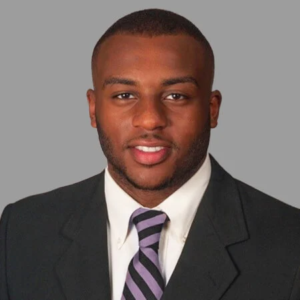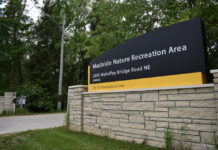
Former Iowa Hawkeye football safety Anthony Gair used to analyze playbooks in preparation for his role on the field. These days, he’s analyzing real estate markets for strategic investments – and while he’s hung up his cleats, he hasn’t hung up on the athlete community. Mr. Gair, together with former Iowa Hawkeye and Dallas Cowboys […]
Want to Read More?
Get immediate, unlimited access to all subscriber content and much more.
Learn more in our subscriber FAQ.
- Unparalleled business coverage of the Iowa City / Cedar Rapids corridor.
- Immediate access to subscriber-only content on our website.
- 26 issues per year delivered digitally, in print or both.
- Support locally owned and operated journalism.
Do you want to read and share this article without a paywall?
Click here to purchase a paywall bypass linkFormer Iowa Hawkeye football safety Anthony Gair used to analyze playbooks in preparation for his role on the field. These days, he’s analyzing real estate markets for strategic investments – and while he’s hung up his cleats, he hasn’t hung up on the athlete community.

Mr. Gair, together with former Iowa Hawkeye and Dallas Cowboys defensive lineman Carl Davis, co-founded the Athlete Investment Collective (formerly the Athlete Investment Community), a supportive platform for athletes interested in pursuing real estate investment.
The aim is to provide a platform where athletes can access resources, education, and exclusive deal flow, fostering a culture of collective collaboration and growth.
“The goal really is to provide a collaborative environment where (athlete investors) can brainstorm, kind of pick each other up, pick each other's brains, but then also provide access to resources and deal flow for athletes that are interested in investing in real estate,” said Mr. Gair.
The AIC is a division of Wooded Oaks Capital Partners, a Texas-based real estate private equity firm co-founded by Mr. Gair and his wife, Sara Gair, in 2023.

The two began investing in real estate in 2019, purchasing single-family homes to flip and rent, sharing their progress on social media. Their efforts quickly drew the attention of Mr. Gair’s athlete friends, some of whom were already involved with real estate projects of their own.
Mr. Gair and Mr. Davis, who were already partnering on smaller projects, began exploring the idea of creating a community to share ideas and collaborate on future projects.
“We really wanted to build a community, to build an environment that was collaborative and also conducive [to] some of the things that we had done in the past to build towards the future,” Mr. Gair said.
Empowering athletes through smart investments
As athletes themselves, the friends knew how important the concept of wise investments are to their targeted demographic.
“I find that the NFL locker room and even a college locker room – now, with the NIL – is a very powerful place,” said Mr. Davis, and it’s not unusual for teammates to discuss issues of money and future investments.
Many athletes make substantial amounts of money, ranging from hundreds of thousands to millions of dollars, he said, but often fail to recognize the collective power they hold when it comes to investing their money.
“A lot of these athletes that have money and have access to equity or capital are wanting to deploy it, but they don't really know how or where to deploy it,” said Mr. Gair.
Unlike traditional investment avenues where participants remain largely anonymous, AIC fosters a sense of community and transparency, said Mr. Davis. The group keeps its investors informed about ongoing deals, their performance, and actively engages them in discussions.
The platform places a strong emphasis on real estate, citing its historical stability and long-term value as a safer alternative to the volatility of the stock market. Before presenting any deals, AIC conducts thorough risk assessments to safeguard investors' funds.
“A lot of times when people try to get you to invest with them, they don't invest their own money,” said Mr. Davis. “Well, we invest our own money in the deal as well. So (because) we have our own interest (in mind), we want everything to be seen through.”
The AIC is composed of approximately 20 athletes, many of whom are football players and former Hawkeyes – like Tevaun Smith, a former Iowa Hawkeye wide receiver, founder of trucking company Smith & Company Logistics Inc. and a current free agent who has played for the Indianapolis Colts, Oakland Raiders, Jacksonville Jaguars, Edmonton Elks, and Ottawa Redblacks.
The Toronto native became friends with Mr. Gair when they roomed together at UI, and have stayed in touch ever since. “We talk almost every day,” he said, and the two partnered together on a few flip houses in Houston prior to AIC’s founding. Surrounding yourself with people who work in the fields you’re interested in is a key to success, he said, which is why the AIC is so important.
After working with single-family flip houses for a while, Mr. Davis and the Gairs segued into multi-family units, which is what Wooded Oaks Capital Investment focuses on now.
“We started to get more and more guys involved in a single family realm,” said Mr. Gair, but the challenge with single-family homes is the need to buy properties individually, unless purchasing a portfolio.
Experience in athletics skills fuel real estate success
Mr. Gair, Smith and Davis say the skills they learned as professional athletes have prepared them well for the world of entrepreneurship and real estate investing.
Hard work, discipline, and consistently showing up are traits that have seamlessly transitioned into the business world, Mr. Smith said.
“Discipline, for sure,” agrees Mr. Gair. “Being disciplined in your approach to analyzing a deal or finding a new market – there's so many different sorts of aspects that play into real estate.”
Teamwork and planning are other crucial components that translate well into their chosen profession. From an athletic perspective, “there's game plans on a weekly basis, depending on who your opponent is,” said Mr. Gair, a crucial trait to analyzing potential deals. “Once we acquire the asset, what's the business plan? How are we going to increase the value of the asset? How are we going to make the experience better for the renters or tenants?”
Mr. Davis said he didn’t have a family background in real estate while growing up, and the industry seemed a little intimidating at first.
“I said, ‘hey, if I can learn a playbook, as complicated as that is, and all these different terminologies and different systems and stuff like that, then I definitely can learn this,’” he said. In both scenarios, the key is to assess risks, understand weaknesses, and develop strategies to mitigate potential problems, he added.




